#a Larger Private Sector
Explore tagged Tumblr posts
Text

Hard to not write a novel on how utterly wrong this is.
The decline in the UK economy is due to a culture brought about by risk averse governments. They are so cautious that they never make a decision on anything.
We get puffed chests about being world leaders in ‘AI’, and barely any deeper thought is given to how we actually do that. It’s always played for the media, and it’s always accompanied with the publication of a white paper that suggests all the various things they could try to do.
But then nothing comes of it. They do not want to take any action. They instead hope that a private company gets lucky and ‘becomes a unicorn’.
Except, due to being so risk averse, they never offer government contracts to any company that isn’t a giant corporate. So the smaller private companies can’t grow. So they can’t be ‘unicorns’ because they can’t get the attention of larger companies in the private sector.
But they need to keep up the illusion that they care about these smaller businesses, so use a mixture of government quangos that get SMEs to compete for £25K grants.
336 notes
·
View notes
Text
"A first-of-its-kind report has discovered that altering the ingredients list or manufacturing methods of widely used medication can really cut back on carbon emissions.
They found a reduction of 26 million tons, enough to cancel out the whole carbon footprint of the city of Geneva for a decade. Best of all, it’s already happening, and in fact, is almost done—those emissions were already saved.
The lifesaving HIV treatment dolutegravir (DTG) is used by 24 million people worldwide.
Today, over 110 low and middle-income countries have adopted DTG as the preferred treatment option. Rapid voluntary licensing of the medicine, including its pediatric version, to over a dozen generic manufacturers, significantly drove down prices, and it’s estimated that 1.1 million lives will be saved from HIV/AIDS-related deaths by 2027.
Its predecessor, efavirenz, contained 1200 milligrams of active ingredient across the three active compounds present, while DTG contains 650 milligrams of just one compound. This small difference—literally measurable in single digits of paper clips by weight—was enough to change the carbon emissions footprint of the medication by a factor of 2.6.
The incredible discovery was made in a recent report by Unitaid, a global public-private partnership that invests in new health products and solutions for low and middle-income countries, called Milligrams to Megatons, and is the first published research to compare carbon footprints between commonly used medications.
“This magnitude of carbon footprint reduction surpasses many hard-won achievements of climate mitigation in health and other sectors,” the authors of the report write.
At the rate at which DTG is produced, since it entered into production and treatment regime in 2017, 2.6 million fewer tons of CO2 have entered the atmosphere every year than if efavirenz was still the standard treatment option.
Health Policy Watch reports that the global medical sector’s carbon emissions stand at roughly 5% of the global carbon emissions and are larger than the emissions of many big countries, and 2.5 times as much as aviation.
“This report demonstrates that we can achieve significant health improvements while also making strides in reducing carbon emissions. By adopting innovative practices and prioritizing sustainability, we can ensure that medicines like DTG are not only effective but also environmentally responsible,” Vincent Bretin, Director of Unitaid’s Results and Climate Team told Health Policy Watch."
-via Good News Network, July 17, 2024
#had never occurred to me before this was a way to reduce emissions#awesome#now someone make pharma companies actually give a shit#still really encouraging for the future. every little bit helps#and apparently this bit is pretty big#hiv#hiv treatment#medical news#carbon emissions#pharma#climate change#good news#hope
600 notes
·
View notes
Text
The Widow | Part One
Pairing: Min Byungyu x f!reader x Baek Yoonho
Content Warning: character death, grief, mentions of blood, tears, loneliness
Genre: angst, eventual fluff, eventual smut, slow burn
Summary: Yoonho never imagined that his best friend would keep such a monumental secret from him, but after his death, Yoonho is tasked with breaking the news to someone he has never met.
Word Count: 2,685
Author's Note: This has not been proofread, so I will be going back eventually and editing, however, this is also part of a series, so as parts come out, I will be trying to edit. I cannot guarantee how quickly parts will come out, nor how long this series will be exactly. Just bear with me and I hope you enjoy!
next | series info | masterlist

In hindsight, Yoonho supposed he really should have figured it out sooner. Byungyu’s distaste for battle wasn’t new, but the desire to join the contract sector as an average citizen was new, one he didn’t expect. The man’s financial situation was elite. He had participated in enough dungeons that he had a very lucrative bank account. He didn’t have to do anything. Though Yoonho supposed he couldn’t blame the man for wanting to do something with his life, though why he didn’t choose to go into the medical field was, well, confusing.
When his best friend had denied him the first few times, it was understandable. Jeju Island had already claimed so many lives, including their best friends, but something had suddenly changed his mind. Yoonho didn’t think anything of it; he was just happy to have the talented healer with them. He should have asked more questions.
“President Baek, exactly how much did you know about Min Byungyu’s situation?” Chairman Go had asked shortly after the fourth and final raid of Jeju Island.
He should have been paying more attention, but his chest ached with grief, and his muscles were sore. Hunter Sung had managed to heal them somehow, but nothing could take away the stinging in his hands when his claws protruded. All he wanted to do was go home and crack a beer, and sit in the silence of his empty apartment he never had the time to fill with personal effects. He wanted to wallow in pity and self-hatred until a new day dawned and he had to go back to his guild and act like everything was ok; worse, to celebrate the enormous victory.
“I’m not sure I understand what you mean, sir. He wanted to give up being a hunter all together and go work as a custodian in an office firm,” Yoonho had explained.
The look the Chairman had given him was diplomatic, but there was a twinge of something, perhaps sorrow, hidden behind his eyes. Yoonho had glanced up at Manager Jinchul Woo who was dutifully standing behind the chairman, but as always, the man was more difficult to read than thousand-year-old hieroglyphics written in decayed clay.
“So you weren’t aware of his private and personal life?” Chairman Go asked, sounding surprised.
There was another thing to be guilty over. He called himself Byungyu’s best friend, but he apparently didn’t know anything at all about him! He’d only ever been to the man’s apartment once, and he’d since moved. He hadn’t set foot in the new, larger place. He didn’t interact with the man all that much anymore, except for the occasional text, which was usually Byungyu sending him memes he’d respond to three days later. There was the occasional beer, but Yoonho had been so depressed after losing Eunseok in the third raid that he’d let Byungyu slip farther and farther from his mind.
“Well, regardless,” Chairman Go sighed, seemingly disappointed. Even Jinchul seemed to be uncomfortable now, shifting his weight from one foot to the other restlessly. “We have a… less than comfortable task to handle. Typically, I’d send Jinchul, but he has been… hugged out… for a while and needs a break, plus he isn’t always as delicate as this situation requires.”
Yoonho wished the old man would get to the point so he could go home. He glanced up at Jinchul, who didn’t seem to care that he’d been called indelicate. Yoonho doubted there was anything about him that was delicate at all. And hugged out? What was that supposed to mean?
As Yoonho was waiting for the chairman to finish his long-winded explanation, Jinchul disappeared, stepping out of the room to grab something off his desk before returning, holding a small, white box.
“As you know, upon awakening, we take a memento from every Hunter to deliver back to the family of a fallen Hunter. Byungyu’s token was changed two years ago from a patch from his uniform, a typical token for a bachelor, into this.”
As Chairman Go finished, Jinchul opened the white box. Resting inside, on a white cushion, was a silver locket with a silver chain. There was something engraved upon the top, but Yoonho didn’t feel like using his heightened sight to strain to read it.
“He has asked that this locket be delivered to the widow he’d be leaving behind, and we thought you should be the one to do it.”
The fact that his best friend was married and he had no clue was another punch to the gut, but what’s perhaps worse was thinking about the grieving woman in their apartment, waiting for her husband to come home. She would know that their helicopter had landed. She’d know that they’d won. She probably wouldn’t know about Byungyu’s death yet. The camera had evidently cut out by then. And now…
“Sir… respectfully… I can’t…” he mumbled, already feeling numb.
Chairman Go pulled something out of his pocket and placed it in Yoonho’s hands. It was a letter, folded a few times on otherwise unremarkable paper. As Yoonho unfolded it, his hands shaking, he gasped as he found Byungyu’s handwriting scribbled as neatly as the man could.
Yoonho, If you’re reading this letter, I can only assume it is because something happened and I have lost my life. First of all, don’t beat yourself up about it. Whatever happened, I’m sure I went out trying to protect my friends, and there is no better way in my book. However, now that I am gone, I am leaving you with a difficult task. I am sorry this has fallen to you. I have a wife. Her name is (y/n). She pieced me back together after Eunseok’s death, and we got married a year later. I know this is a bomb to drop, and I tried to tell you, many times, but neither of us were in a good state at the beginning and as you feel deeper and deeper into your guild, using the work to keep you from actually feeling the sorrow, I moved on, and I didn’t think you’d understand. Yoonho, being a Hunter is hard work and it’s messy. I have never regretted my decision to leave, but if something has pulled me back in, I know I died happily for you. Do not let my death pull you into another depression. This one might kill you. You were reckless enough as it is. I am not mad at you for however you pulled me back into the game. Do not let your mind convince your heart that I am. And don’t throw yourself into your work to punish yourself. That’s not doing anyone any favors. Instead, you can atone for my death (if you still feel like you need to) in two ways. Take the locket and a letter back to my Jimin. Tell her how I died, she needs to know everything. Comfort her. She worries a lot and has habits similar to your own. Don’t let her kill herself through her work. Be there for each other. Stop trying to take the blame for everyone else's decisions. We all make our own. You have never forced anyone to do anything. We make decisions based on your words sometimes, but they are still our decisions. Stop letting yourself be convinced that you’re a god who mind-controls everyone else into doing your bidding. Everything I have ever done has been of my own volition. I wish you the best in this life, Yoonho. Don’t be afraid to let yourself live life and find love. Hunters are constantly busy, but you can have it all. You can be a Hunter and a life. It’s time for them to stop being one in the same. I will see you on the other side, my friend. Love, Byungyu
The letter had tears pricking to the corners of his eyes and he finally understood the smile Byungyu had given him as Jinwoo had released his shadow. He clenched the letter tightly as looked up at the chairman, only nodding once. He’d watched as Chairman Go fished out the second letter and then he was dismissed, locket and letter tucked inside the same box in his shaking hands as he made his way to the car and punched in the address he’d been given.
So here he was, standing in the hallway of the apartment building he’d been directed to, staring at the plain white door that matched all the others, reading the number from Jinchul’s text for the third time to be absolutely sure he was at the right door.
He could hear movement inside and music. There was the occasional clang of something hard slamming into something else that almost made his skin crawl. He wanted to cut tail and run, to pretend this wasn’t happening, but his arm seemed to act on its own as it raised and knocked firmly.
The music stopped and he could hear bare feet padding across the floor to the door, his ears picking the sound up easily. He heard the door unlock, and a second later, it was pulled open, revealing his best friend's widow dressed in sweatpants and a stained t-shirt.
“Baek Yoonho?” your voice was full of confusion. He couldn’t blame you.
“You know who I am?” he asked.
“Of course,” you said, wiping your soapy hands on your pants. “Gyu has so many pictures of you and Eunseok all over this place. It sometimes feels like a shrine,” you chuckle softly.
“How can I help you? Is Gyu ok? He hasn’t come home yet and by the look of you, you all just got back.”
“Can I come inside?” Yoonho spoke, voice soft.
“Uh yeah sure,” you hold the door open wider.
He stepped through, admiring the place. The door opened into the front room, living room, where there was a paused Spotify playlist casting from the television. There were slightly mismatched couches pointed at the television, the longer of the two was a thick, plush burnt orange, and the other, smaller one gray with a blanket thrown over the back of it. There was a coffee table with books stacked up on one side and a vase with a handful of roses on the other side. As you led him to the couches, he could see the kitchen from a serving counter window with three bar stools on the end. Inside the kitchen, he could see a strainer full of wet dishes and the sink full of soapy water with a washcloth perched on the side, likely discarded when he’d knocked.
You motioned for him to sit on the orange couch while you sat down on the gray one, folding your hands into your lap and looking at him expectantly.
Yoonho’s hands began to shake, and the box in his pocket suddenly felt like it was scorching his skin. He clasped his hands together, trying to hide the way they quavered.
“Mr. Baek… Where is my husband?” Your voice was quiet, but his accelerated hearing could pick up on the way it cracked on the final word.
“He…” Yonho had to clear his throat and blink away the tears that threatened to gather. “He didn’t make it… He died… trying to protect me,” his voice came out hoarse and broken in a half-choked sob.
You were quiet momentarily, processing what he’d just said. When you finally spoke, your voice was strong but uneven.
“Did he suffer?”
Yoonho tried to think back. Had he? When he saw that things arm go through him… all he could see was blind rage.
“Not for long. It was over quickly. But he managed…” he swallowed. Should he tell you that his soul saved someone? No. Probably not. And he promised Jinwoo to keep that confidential anyway. “He managed to save one more life before… he was truly gone.”
He looked up into your face. You had silent tears streaming down your cheeks and made no move to brush them away. Your bottom lip trembled, and your chest heaved with labored breathing.
“I’m not sure if you’re aware… but when becoming a Hunter under the Association, they provide the Association a token in the event they don’t make it back from a raid. This was his,” reaching into his pocket, Yoonho pulled out the box and opened it, placing it on the coffee table.
You took out the letter on top first and, using his abilities, if against his will, he was able to read the message her husband had left for her.
My Love, If you are reading this, I have left you alone in this life and in this world and for that, I am truly sorry. Please understand that if I died in a raid, it was because I will always be there to back up Yoonho and to protect him from himself. He isn’t the best at patiently waiting for the right time to strike, and if no one else is there to back him up when he pounces, I will always be there. Yoonho scoffed at that. ‘Pounces.’ He wasn’t a cat! He didn’t pounce! Please understand and don’t hate him for it. It was not his fault. Let him be there for you. You’re going to need to lean on each other. Don’t let the grief drag you down. And don’t let him blame himself. You both meant so much to me. Know that though I died protecting him in battle, I died protecting you back home. I could not go on living without you and I know that is unfair since that is exactly what I am asking of you. Be strong and move on. Don’t let my death hold you back from living your life. We will-
You put the letter down before Yoonho could finish reading and buried your face in your hands to cover the wails that left your lips. Yoonho wasn’t sure what came over him. Maybe it was Byungyu’s letter to him, maybe it was the fact that he’d always hated seeing women cry. Whatever the reason, he found himself moving onto the gray couch beside you and placing his hand on your back, stroking it soothingly. He wasn’t expecting you to lean into him, burying your face in his side. It took him a second to respond, but when he did, he held you against his side securely and continued to rub your back.
You sat like that for a while. You sobbing and Yoonho comforting you in any way he knew how. When your shoulders finally stopped shaking, and you shifted against him, he loosened his hold, allowing you to sit back up. Your eyes were red and bloodshot, but you looked back to the table where the box with the locket still sat.
Picking up the box, you examined it before lifting it out of the box and opening the locket. There, resting in the two tiny frames, was a picture of Byungyu giving his most dazzling smile, dressed in his Hunter’s uniform with dirt stained on his cheek. It was an image taken shortly after the first raid under the White Tiger’s guild. The second was you and Byungyu holding onto one another on your wedding day, looking at each other with gazes full of love.
A sob left your throat as you closed the locket and passed the necklace to Yoonho.
“Help me put it on,” you said.
Taking it, you turned your back to him and lifted your hair. Yoonho slid the locket around your neck and carefully clasped it in the back. When it was secure, you let your hair fall over the chain and looked down at the jewelry resting on your shirt.
“Now I guess I have two tokens from him,” you whispered.
Yoonho was going to ask what you meant until he watched you place your hand on your belly, a sad smile spreading across your face. Yoonho had never felt so sick.
#solo leveling#solo leveling x reader#baek yoonho#min byung gyu#yoonho baek x you#solo leveling angst#solo leveling fluff#solo leveling smut#slow burn#solo leveling slow burn#pregnancy#character death#solo leveling season 2#jeju island#Beru raid#yoonho x you#hurt/comfort#solo leveling hurt/comfort#Yoonho hurt/comfort
50 notes
·
View notes
Text

Trump's response to the air disaster over the Potomac River which he indirectly contributed to is typical. He evades responsibility while spewing outright lies to distract attention.
Trump’s Racist Rants Conceal the Right’s Air Safety Failures
The number of air traffic controllers declined in each year of Trump’s first presidency. Then Trump plunged air traffic controllers (and other federal workers) into uncertainty during the 2018–19 government shutdown, which forced controllers to work without pay—a major blow to their already battered morale. That shutdown only ended, it should be remembered, when enough New York area controllers called in sick to ground flights on the East Coast. The Biden years saw a slow rebuild of controller ranks. But warning signs of a systemic crisis were growing. Training of new controllers was disrupted by the Covid pandemic, and staffing shortages continued. A spate of near-misses led the FAA to convene a unusual “safety summit” on March 23, 2023, to discuss solutions, and the office of Department of Transportation Inspector General Eric J. Soskin completed a 2023 audit that found that 20 of the FAA most critical facilities 26 (77 percent) were below the 85 percent minimum staffing levels and supervisors were mandating overtime and six-day work weeks to cover staff shortages. Biden’s FAA hired 1,811 controllers in 2024, and his 2025 budget sought funding to hire 2,000 more. Trump’s return to the presidency has already been a setback for air safety. He fired DOT Inspector General Soskin, who illuminated the extent of the FAA’s staffing problems. Trump’s White House alter ego Elon Musk succeeded in driving Biden’s FAA administrator, Mike Whitaker, from office even before Trump was sworn in, because Whitaker’s FAA had the temerity to fine SpaceX for safety violations. Musk even went so far as to claim that “humanity will forever be confined to Earth unless there is radical reform at the FAA!” That Trump’s FAA intends radical changes seems clear. Astonishingly, his letter encouraging federal workers to resign their positions and find private sector jobs went to air traffic controllers despite the continued staffing crisis at the nation’s airports. [ ... ] Trump’s “deep state” conspiracy theories and obsession with DEI are doing far graver harm, reducing the right’s anti-government discourse to authoritarian theater and farce. Make no mistake, these recent events are a harbinger of what is to come. Trump’s effort to deflect attention to DEI should not avert our eyes from the larger collision that threatens the very functioning of our government unless we make a course correction.
If you can avoid flying during the next few years, please wait.
A reminder of the true DEI...

^^^ Copy and use frequently!
64 notes
·
View notes
Text
America’s Future Depends on DOGE
Wall Street Journal
If Trump and Musk don’t succeed in showing the bureaucracy who’s boss, it’s likely no one ever will.
Critics view the Department of Government Efficiency’s emails asking federal employees for evidence of productivity as chaotic, arbitrary and even cruel measures to impose on a devoted civil service. But Elon Musk is simply bringing normal private-sector standards to a government that desperately needs them. Since the Pendleton Act of 1883 introduced merit-based selection and civil-service job protections for federal workers, the administrative state has proliferated without sufficient checks and balances from the president or Congress.
The federal bureaucracy has ballooned from a few agencies to more than 400, many of which are “independent” of the president. Americans often view the president as responsible for the actions those agencies take. The system nudges new presidents to give up and go along. And that’s exactly what they’ve done. No president—not Calvin Coolidge, Herbert Hoover, Richard Nixon or Ronald Reagan—has cracked this nut. Most reforms have made the administrative state larger, not smaller.
As we’re seeing now, substantial opposition awaits anyone who challenges the bureaucracy. Unions are powerful. Intimidation from those with institutional knowledge can be overwhelming. Fear of the media has also been a deterrent to action. Every president has been at least somewhat fearful of the intelligence agencies. Industry leaders who have captured the agencies, including many campaign donors, have been too powerful to unseat or control.
Countless cabinet secretaries come and go with the intention of changing the system. They get big offices, a nice portrait and social status, but the bureaucrats know that the political appointees are temporary and easily can be ignored. Frustrated by institutional inertia, the appointees often leave outwitted, outgunned and demoralized.
Meanwhile, the American people feel increasingly oppressed, taxed, regulated, spied on, browbeaten, hectored and harassed. Voting never made a difference because the politicians no longer controlled the system. The bureaucracies rule all. We’ve come to know this in our gut, which is why voters’ trust in the system has eroded as agencies’ power has built up.
The Biden years underscored this point. We didn’t even need a conscious or active president, only a figurehead. Behind the scenes, institutions ran everything.
How can the U.S. deal with this problem? President Trump alone figured it out in his last term: He simply took charge of agencies in a limited way with selective firings, which he believed he had the legal authority to do. This unleashed howls of horror and whispers of plots from his critics, including in the media. Entrenched administrators hatched clever schemes to thwart his plans and show him who was boss—not the democratically elected president but the bureaucracy.
The message from today’s civic elites is that the president’s job is to pretend to be in charge while doing nothing meaningful. Shut up. Don’t disturb the administrative state. Let it keep doing its thing without oversight or disruption, and you’ll get your library and bestselling memoir.
Mr. Trump refuses this deal. In his second term, he’s determined to slay the bureaucratic beast he knows all too well from his first term and the Biden years. DOGE’s efforts are epic, breaking more than a century of acquiescence to the deep state. The Trump team is courageously confronting the problem head-on, come what may. Mr. Trump’s allies know that they must act quickly and with some degree of ferocity, even recklessness, lest we default back to the status quo of leaders who pretend to be in charge while the embedded “men of the system”—to adapt a phrase from Adam Smith—run things behind closed doors.
It’s critical that this bureaucracy-gutting effort succeeds. There might never be another chance.
44 notes
·
View notes
Text

DISSENT MAGAZINE
On March 27, President Donald Trump summarily overturned decades of federal labor relations policy and stripped more than 700,000 government workers of their union rights with a stroke of his sharpie. His executive order Exclusions from Federal Labor-Management Relations Programs, which effectively voided union contracts at dozens of departments and agencies, constitutes by far the largest and most aggressive single act of union-busting in U.S. history.
The stated rationale for Trump’s order—that the targeted workers are in agencies that affect national security and they therefore are ineligible for union representation—is flimsily transparent. Even the White House can’t sustain the lie. The administration’s own fact sheet points to the president’s real motivation. His order targets agencies whose unions “have declared war on President Trump’s agenda.” How have these unions “declared war”? Apparently, simply by attempting to enforce labor contracts and represent members in grievance proceedings. As the fact sheet notes, Veterans Affairs (VA) workers are losing their rights because their unions had the temerity to file “70 national and local grievances over President Trump’s policies since the inauguration.”
It is obvious that Trump is exacting revenge on unions that are challenging the draconian cuts and closures inflicted by Elon Musk’s renegade Department of Government Efficiency. Tellingly, unions believed to be sympathetic to the Trump agenda, such as those that represent federal law enforcement workers (whose work is more closely related to national security than that of, say, VA nurses or employees of the General Services Administration), have been exempted from his sweeping action.
The Radicalism of Trump’s Union-Busting
With his radical and blatantly political order, Trump, like a deranged Samson, is straining to pull down the solid pillars that have undergirded a remarkably stable system of federal labor relations for decades. If he succeeds, his action threatens many millions more than the federal employees directly affected by his executive order. As the nation’s largest employer, what the government does to labor inevitably ripples through the entire economy.
The only event in U.S. history comparable to Trump’s action is Ronald Reagan’s firing of some 11,500 striking air traffic controllers in 1981. Reagan’s crushing of the controllers’ union, PATCO, brought to a screeching halt the rapid expansion of public-sector unionization in the 1970s and catalyzed a wave of strikebreaking by private employers that set back the entire labor movement. In some ways, labor still struggles with the fallout of that fateful conflict. If Trump’s current action stands, its destructive force promises to be many orders of magnitude larger than the PATCO affair.
To grasp the enormous implications of Trump’s order, consider the elements of the time-tested structure that he is busy pulling down. The first pillar of the system was put in place in 1883 with the Pendleton Act, which created the federal civil service to professionalize those who worked in government and to end the spoils system that allowed the party in power to oust the personnel of federal agencies and install its supporters no matter their qualifications. Under the U.S. Civil Service Commission, federal workers freed themselves not only from fealty to corrupt political bosses but also from the status of at-will employees who can be fired for any lawful reason, or no reason—the condition under which most American workers, who lack union representation, operate to this day. As the civil service emerged, one of its central ideas was that its competent workers could not be fired without cause.
The second pillar of the system was put in place by the executive actions of a bipartisan line of presidents—Franklin D. Roosevelt, John F. Kennedy, and Richard Nixon—each of whom played a role in expanding federal workers’ collective bargaining rights with the government. The first step was taken by Roosevelt. In addition to signing the Wagner Act, which finally guaranteed most private-sector workers the right to unionize in 1935, he allowed a few federal agencies such as the Tennessee Valley Authority to bargain collectively with unions representing their tradesmen. Roosevelt’s experiment was seized upon and expanded by Kennedy. As Cold War imperatives made it unseemly for a government that claimed to lead the free world to deny its own employees any voice over the terms and conditions of their labor, Kennedy institutionalized collective bargaining for most federal workers by executive order in 1962. Seven years later, Nixon signed an executive order that further strengthened federal union rights and simplified the process through which workers chose union representatives.
(Continue Reading)
#politics#the left#federal government#progressive#progressive movement#democratic socialism#labor rights#labor unions#workers rights#organized labor#dissent magazine#federal workers
29 notes
·
View notes
Note
Wrt that a.i bubble post I get the impression the deeper scandal, and larger bubble, is the relationship between state subsidies and private sector innovation hitting the limits on its efficiency and most of it being reduced to an embezzlement scheme to the point that a lot of contracts are highly overvalued, and a market correction on this would be pretty disastrous for the tech sector
yeah i think this is kind of true in various permutations across tech. like a lot of these startups are essentially useless unprofitable products that exist to bring in investor money lol. i mean even like gig economy apps like uber that are considered lasting companies are often unable to operate in the black even playig fast and loose with labour laws. everybody pitches themself as amazon in the sense that the promise is you just need to invest in us until we get total market capture, and then we can set the prices wherever we want and turn a profit. but most companies are not amazon and do not reach anywhere near that level of dominance and so they just keep going off investor money as long as it's stupid enough to keep coming. newspapers kinda did the same when they started going digital and the serious ad revenue was always just around the corner. clown economy it's like throwing money at a primary school football player because he promises one day he'll be a star and pay you back with his nike contract money
29 notes
·
View notes
Text
Excerpt from this story from Truthout:
It takes approximately 700,000 megawatt hours of electricity to power Chicago’s more than 400 municipal buildings every year. As of January 1, every single one of them — including 98 fire stations, two international airports, and two of the largest water treatment plants on the planet — is running on renewable energy, thanks largely to Illinois’ newest and largest solar farm. The move is projected to cut the carbon footprint of the country’s third-largest city by approximately 290,000 metric tons of carbon dioxide each year — the equivalent of taking 62,000 cars off the road, according to the city. Local decarbonization efforts like Chicago’s are taking on increasing significance as President-elect Donald Trump promises to reduce federal support for climate action. With the outgoing Biden administration doubling down on an international pledge to get the U.S. to net-zero emissions by 2050, cities, states, and private-sector players across the country will have to pick up the slack.
Chicago is one of several U.S. cities that are taking advantage of their bulk-buying power to spur new carbon-free energy development.
Chicago’s switch to renewable energy has been almost a decade in the making. The goal of sourcing the city’s power purely from carbon-free sources was first established by then-Mayor Rahm Emanuel in 2017. His successor, Mayor Lori Lightfoot, struck a 2022 deal with Constellation, an electricity supplier, to purchase the city’s energy from the developer Swift Current Energy beginning in 2025.
Swift Current began construction on the 3,800-acre, 593-megawatt solar farm in central Illinois as part of the same five-year, $422 million agreement. Straddling two counties in central Illinois, the Double Black Diamond Solar project is now the largest solar installation east of the Mississippi River. It can produce enough electricity to power more than 100,000 homes, according to Swift Current’s vice president of origination, Caroline Mann.
Chicago alone has agreed to purchase approximately half the installation’s total output, which will cover about 70 percent of its municipal buildings’ electricity needs. City officials plan to cover the remaining 30 percent through the purchase of renewable energy credits.
“That’s really a feature and not a bug of our plan,” said Deputy Chief Sustainability Officer Jared Policicchio. He added that he hopes the city’s demand for 100 percent renewable energy will encourage additional clean energy development locally, albeit on a much smaller scale, which will create new sources of power that the city can then purchase directly, in lieu of credits. “Our goal over the next several years is that we reach a point where we’re not buying renewable energy credits.”
More than 700 other U.S. cities and towns have signed similar purchasing agreements since 2015, according to a 2022 study from the World Resources Institute. Only one city, Houston, has a larger renewable energy deal than Chicago, according to Matthew Popkin, the cities and communities U.S. program manager at Rocky Mountain Institute, a nonprofit whose research focuses on decarbonization. However, he added, no other contract has added as much new renewable power to the grid as Chicago’s.
22 notes
·
View notes
Text
Random thoughts:
#notaneconomist (although I do thoroughly enjoy strategy) These are just my own personal observations and conclusions
For some reason my mind has wandered over to the state of the US economy, not hard to understand why given the times
It's the circular nature of the US military being the backbone of US financial stability that has for some reason taken the attention of my wandering mind
This is what has occurred to me:
The backbone of the United States economy is of course its military spending
The US military has a budget larger than the five following countries with the highest spends comparatively combined
We should find it unsurprising given that the majority of what is not internal spending is spent on development in terms of building military vehicles, weapons, firearms etc etc and that the majority of this is done within the private sector
For example: OshKosh builds trucks to transport tanks and also many different types of logistic vehicles, Pokémon Go helping to build a massive global spatial map, Angry Birds data being used to help build a surveillance network, Swarovski making riflescopes etc etc
Anyway, things get contracted out to be built right?
Given that most major corporations operate under much larger umbrellas it would make sense that these companies would have an invested interest and whether or not the US government actively keeps military funding high enough for everyone to get a piece of the pie
Given that internal spending on a product usually requires a profit markup I would imagine that the US government in terms of its military spending is not exactly getting bang for its buck.....(And lord knows they aren't spending it on their veterans).....so of course the business lobby wants to help ensure that they keep getting these high priced contracts to keep their profit margins high while having some sort of other, well I guess a front; like kids toys, or a gaming app, or jewelry to help disguise where it is they're getting a lot more of their companies earnings from
The other thing is that the US government needs to justify to the public the monstrosity of a budget for the military, and in order to do that you need to maintain a level of insecurity; not only in their own country by keeping weapons accessible but in other foreign nations by staging military coups, covertly funding terrorist organisations, staging a proxy war etc etc which of course we all know by now that the CIA helps ensure happens in order to "protect American interests"
So to summarise all of that the backbone of the US economy is basically a giant money laundering scheme run through its military in order to fund its business lobby and as long as the rest of the economy underperforms they were always be able to justify having an intensive military spend in order to prop it up
The worst thing that could happen to its economy is the US actually becoming a peaceful state; it seems to me that the recent events over the past couple of years have alerted the working class to the extent of which they are being squeezed in order to fund this business lobby
Unfortunately, this bubble that they have created around themselves will eventually burst
Even the Baby Boomers are starting to feel the pinch of the water in expense of living in this economy that the Millennials and Gen X have been living through; even the conservative working class are starting to turn on the system that they have been living in
The United Healthcare shooting is a prime example of it
It would seem that the ruling class has squeezed a little too hard and inadvertently started the class war they never wanted all under their own gusto
*slow clap*
#us govt#us government#lobbying#us military#us economy#us congress#oshkosh#swarovski#angry birds#pokémon go#united healthcare#luigi mangione#ceo shooting#class war#boomers#gen x#millennials#gen z#angelstardust
20 notes
·
View notes
Text
The sun was just coming up on March 19, 2023, as gunmen invaded the Chimbolo gold mine in the Central African Republic and opened fire on the Chinese employees residing there. The site’s security guards were easily overpowered, and nine Chinese, part of a contingent that had launched the site only days earlier, were killed.
Rebel groups quickly blamed the assault on Russian Wagner Group operatives, who the rebels claimed were intent on scaring the Chinese. According to this account, the Russians were jealous of China’s long-standing presence in the country and wanted to deter Beijing so that Moscow could enlarge its own operations in the Central African mining sector.
No evidence was provided for these assertions, and the identities of the perpetrators of the attack remain unclear two years later. Yet the incident raises questions over the potential clash between growing Russian and Chinese influence in sub-Saharan Africa.
On the most basic level, the two countries have fundamentally different objectives on the continent. Whereas China has sought stability to ensure its considerable investments can come to fruition, Russian involvement seems to be motivated by and thrive in insecurity and instability. This could put them on an unintended collision course.
China’s presence is much larger than Russia’s, with China-Africa trade reaching $295 billion in 2024—making it the continent’s biggest single trading partner. This compares to just $24.5 billion for Russia.
China has been involved in Africa for decades, while Russia’s resurgence on the continent is much more recent, dating to the 2010s.
“Russia tends to focus on building political alliances, selling weapons, and using private military contractors, like the Wagner Group, to provide security,” said Justus Nam, an independent research consultant focusing on China-Africa relations. “On the other hand, China has centered its strategy on long-term economic ties.”
The Belt and Road Initiative (BRI) is at the center of this strategy. The BRI is a foreign economic policy and investment program, which now includes all but two African countries. The extent of the initiative is underscored by the fact that at least 46 African ports have been built or financed or are currently operated by Chinese state-owned shipping companies.
Moscow, by contrast, has provided defense assistance to a number of countries where armed groups are widespread and has often helped fledgling or failing presidents to remain in office, where they otherwise might have been overthrown by militias or coups.
It is not a coincidence that Mali, CAR, and Sudan, all of which are currently experiencing widespread insecurity and fragility, are some of the major hot spots of Russian influence on the continent.
While Russian and Chinese interests have often diverged, they have frequently been mutually beneficial because of their shared desire to counter Western influence.
China has likely been pleased by the widespread use of pro-Russian propaganda to encourage states with already anti-French and anti-Western beliefs to boot out French and U.S. troops and bases.
“China is generally happy to use Russia’s behavior opportunistically if it counters U.S. influence,” said William Matthews, a senior research fellow for China and the world at Chatham House. “They are typically not working together but keeping out of each other’s way.”
In November 2024, two countries that had increasingly showed signs of becoming closer to Russia—Chad and Senegal—asked France to withdraw its troops and bases, followed quickly by Cote d’Ivoire in December 2024, bringing to six the number of countries in West Africa that had made such requests in the past five years.
Despite these convergences of interests, areas of competition and contention are likely to emerge in the next decade.
China and Russia are now the two largest arms suppliers to sub-Saharan Africa. Russia provides 21 percent of arms imports, marginally ahead of China, which brings in 18 percent. Western sanctions against Russia in recent years have made it more difficult for Moscow to sell weapons to the continent and have created an opportunity for China in this market.
“Russia dominated this sector before, but now China is moving into it as well, creating the scope for heightened competition between the two countries,” said Chris Alden, a professor of international relations at the London School of Economics and Political Science.
Meanwhile, battles for access to crucial minerals could also become problematic. China controls around 30 percent of African copper and 50 percent of cobalt production, giving it significant control over global supply chains, which it will want to protect.
This determination to protect its access to resources has been underscored in eastern Democratic Republic of the Congo, where conflict has reignited in recent months between Rwandan-backed M23 rebels and the Congolese state.
Chinese companies own the majority of cobalt, uranium, and copper mines in eastern Congo, and China has provided drones and weapons to the Congolese government and neighboring Uganda to fight the insurgent rebels. Beijing has even urged Kigali to end its support to M23, most likely because it wants to restore stability around its mines in eastern Congo.
This Chinese preference for subtle influence and maintaining stability in areas of investment to ensure that it gets good returns could gradually come into conflict with Russia’s efforts to sow and encourage violence and division. Without instability, Russia’s model of exchanging security assistance for natural resources is likely to be ineffective.
“If African countries turn to Russia for security needs,” Nam said, “they might deprioritize China’s infrastructure investments in conflict-prone areas.”
This may not matter much when China and Russia do not look to build influence or investment in the same countries. Yet where their presence overlaps, as in the case of CAR and increasingly in Equatorial Guinea—where China has plans to build a naval base and Russia is also providing Wagner security assistance—this may pose some challenges.
This is not a battle Russia wants. Moscow is already struggling with its military quagmire in Ukraine, and it has relied heavily on China to help it circumvent Western sanctions following its invasion of Ukraine in 2022. Given China’s importance to Vladimir Putin’s political survival, Beijing holds most of the cards in this diplomatic dance: Moscow would almost certainly have to back down if China demanded it.
But influence and investment in sub-Saharan Africa are vital to Russia, both as a means of ensuring access to crucial minerals and as a buffer to Western sanctions. It is therefore unlikely to withdraw its operations on the continent unless it is forced to.
Equally, although it would likely pose less of an existential risk to China, Beijing would also much rather avoid any confrontation with Russia.
China currently has no interest in dealing with security issues in the vicinity of its African investments. But the more bullish Russia is on the continent, the more likely it is that security challenges will spill over borders and pose problems for China’s investments and influence in these countries.
More than 10,000 Chinese firms now operate in Africa, and the value of Chinese business there since 2005 has risen to more than $2 trillion.
“The stability question is more important to China in the long term,” Alden said. “The question will then be, how does China stop Russian actions from damaging Chinese interests?”
A notable flashpoint could be Ivory Coast, which finds itself in an increasingly unstable neighborhood where Russian influence is prevalent. Russia is eager to build a presence in Ivory Coast and appears to have helped countries in the Sahel run disinformation campaigns in Ivory Coast in recent months.
At the moment, Ivory Coast remains relatively stable, though elections are due this year with the potential for greater unrest. China, which is Ivory Coast’s most significant trading partner, with trade more than doubling between 2017 and 2022, would likely be extremely frustrated if Russia were to create disruption there that undermined its economic ties.
Not only is there a security challenge, but if countries partnering with Russia are increasingly facing civil unrest and conflict, they are also unlikely to be able to pay back Chinese infrastructure loans, posing another problem for China.
Chinese loans account for around 12 percent of African public and private debts, and some countries are in a particularly bad way. For instance, by 2021, Equatorial Guinea’s debt to China was 49.7 percent of GDP, and in 2019, Djibouti’s had reached 71 percent and Zambia’s 65.8 percent.
Then, there is the added conundrum of what happens when Russian havoc antagonizes the West.
On the one hand, the chaos created by Russia distracts the West from countering Chinese activities and expansion because it is too concerned by Moscow’s more belligerent acts.
Yet there is also a possibility that while Chinese influence went relatively unimpeded prior to Russian involvement, the West will now fight harder to maintain a presence on the continent to counter Russia, in turn frustrating China’s ambitions or competing directly for resources.
This is perhaps most notable in the advent of the Lobito Corridor, an 800-mile railway that will link Congo’s mining regions to Zambia and the Angolan port of Lobito, on the Atlantic Ocean. The railway line, for which the first feasibility studies were completed in September 2024, is funded by the United States and the European Union and is a direct counter to the BRI.
Then-President Joe Biden visited Angola in December to promote this project and demonstrate U.S. commitment to the continent, while Angolan President João Lourenço has described the United States as the ideal partner to reequip Angola’s military.
None of this was good news for China, a long-standing Angolan ally, which has countered aggressively with new investments in Angola, including an announcement that Beijing will construct Angola’s first highway. The project will link southern and northern Angola and is due to begin construction this year.
For China, African nations are indispensable; they provide it with considerable trade and wealth as well as access to strategic ports. Yet despite all the destabilization that Russia potentially brings, Moscow’s involvement is also beneficial because of the way it further undermines Western influence in the region.
In such circumstances, over the longer term, China may opt to adapt so that it can have its cake and eat it too. Beijing may start to mimic Russia’s use of mercenaries and develop its own private security sector to reduce its reliance on stability.
By deploying its own mercenaries, it could better defend its operations abroad, enabling it to continue its investments in spite of Russian-inspired chaos while also keeping Moscow involved on the continent as a counter to the West.
11 notes
·
View notes
Text
Water in Our Bird Bones
Clone x OC Week - Day 3, Conflict || Wolffe x OC
Event Masterlist
SUMMARY: Of all the brilliant ideas the Senate’s come up with, a Core World dance troupe performing for the men for “morale” was up there on Wolffe’s list of Stupid Things Politicians Do. Still, the reprieve is nice. That is until he’s confronted with some ugly truths about his armor…and his dancing abilities.
Word count: 3.3k
Tags & Warnings: social & political commentary I guess, environmentalism, descriptions of canon typical violence, brief talks about terrorism and violence, folk dancer oc, inspired by Tibetan folk dances, Wolffe learns to dance
“You’re delusional. What you’re suggesting is treasonous. I know the Chancellor; he is a good man!”
Wolffe had his helmet off, so he had to fight to keep an impassive face. For all Skywalker bitched about how he “wasn’t a messenger bird” for the Chancellor, he sure was quick to come to the old politician’s defense.
She looked at Anakin. A small, lithe frame, a good head shorter than the Jedi. Wolffe recalled her name was Mirjala, when she’d introduced herself to them walking off a ship ramp with flashy, glittery eye makeup. She opened her mouth. Then closed it. Wolffe noted, with some unease, that she seemed unsure how to react. Almost frightened. He couldn’t blame her—the General was quite a bit taller and definitely broader, with an accusing stance that was anything but friendly. If it were one of his brothers, he’d smack the dumb kriffer up the back of his head for being so imposing on a being so clearly smaller and weaker. He exchanged a small glance with Rex. She breathed in.
“Do you…. do you know why this troupe exists, Knight Skywalker?” Mirjala asked politely, fiddling with her fingerless gloves—plucking at the woolen fibers. Around them, people bustled around moving boxes and setting up the large stage.
“No,” General Skywalker replied tersely. General Koon made to intervene but Skywalker plowed on. “How does this relate?”
“Humor me.”
Wolffe watched Skywalker twitch, half amused at the man’s clearly volcanic temper and half wanting to tell him to sit the kark down.
“Fine.” Skywalker bit out, giving Wolffe another reason to want to put his face to a cheese grater. Fucking bantha balls, how could they let this man have a child. “Tell us why.”
She bit her bottom lip. Still pulling at fibers, but looking unperturbed, oddly enough.
“Twenty years ago, you could find our dances anywhere on Alshaka.” Her face turned distant. Not so much looking at them as she was looking past. “My people have always loved art. Our greatest achievements were our monuments. Every child learned the steps to the Geshan in their afterschool hours. Our most popular places were our museums, our theaters, our studios.”
The small woman exhaled shakily.
“And then, ten years ago—I was only nine at the time—there was an uprising. A civil war, of sorts. It had started as a small band of extremists, who claimed that we were being kept docile and happy with our arts because it made us easier to control. A laughable sentiment, really, as our arts were our greatest export in the sector and it made us loved. But slowly, the small band grew larger. Louder. But it all changed when a private military group, an off-world PMC, decided to throw their lot in with the extremists. And suddenly it wasn’t so much a small band of malcontents as it was a makeshift army.”
Mirjala closed her eyes. Glitzy blue paint covered her eyelids, lined with rhinestones.
“I’m sure you can infer what happened next. They destroyed everything. Eight thousand years of history. Burned.” Mirjala murmured. Her voice, however soft, commanded their attention entirely. “We begged the Republic for aid and, to their credit, they did give it to us. They got rid of the extremists, stopped the riots and the lootings and the burnings, on only one condition.”
She opened her eyes. Staring straight at Wolffe, he suddenly felt naked. Perceived.
“May I see your vambrace, Commander?” She inquired politely.
He looked around. Skywalker’s face was unreadable, but General Koon gave a weary nod. He unclipped his right vambrace that didn’t have his comms, and handed it to her. She took it gently.
Handling the piece of armor with care, she turned it over in her bird-like hands. Wolffe almost wanted to snort. That thing had been through shitty mud-filled sinkholes and Seppie-made acid rain; it could survive more than a little rough handling.
“How long have you had this for, sir?”
He wanted to laugh. She definitely shouldn’t be calling him sir.
“A year and ah half ma’am. Lost my first in a downed ship.” He said crisply. She nodded.
“It’s served you well.” Wolffe thought she was looking at his banged up vambrace with a little too much reverence. Everything on him was standard issue stuff. Still, she handled it carefully.
“Yes, ma’am.”
She ran her thumb over the strip of gray paint, and traced the edges where the polish chipped. “You’ve taken great care for it. The plastoid is holding up remarkably for its age. ”
“Thank you, ma’am.”
She handed the vambrace back to him with a soft smile. Downturned eyes.
“They gave us humanitarian aid and representation in the Senate as a system on the condition that we allow the Republic to mine our lands for peraleum. Plastoid is produced from peraleum.”
“My people were left scarred from the uprising. The streets were quiet. There was nothing to celebrate when we were burying by the masses. Our grief was too great. There was too much damage. The surface of Alshaka is tough, and it takes great time to create proper burial sites. Many families, mine included, had to burn their dead because it would take too long to properly bury them, and the bodies would rot. My brother now sleeps with the wind, instead of in the earth with our ancestors.” Wolffe watched her eyes follow his vambrace as he gently clicked it back in place, feeling a bit like he should apologize for even wearing the armor.
“I’m sorry,” Skywalker offered. It was mournful, something also on the tip of Wolffe’s own tongue, but it sounded too pathetic for what she was saying. “Your people have suffered greatly. But that has nothing to do with the Chancellor.”
You also haven’t told us about why this troupe exists, Wolffe mentally added.
He stayed silent.
“My people have recovered much faster than was thought possible thanks to the economical boon that is the peraleum mining industry. But it’s left our land barren and poisoned our air from the fumes that come from processing plants. In turn, we have fueled the Grand Army of the Republic by supplying its soldiers with armor.” Mirjala nodded towards where Wolffe and Rex stood. “But sometimes I wonder whether this would have happened had that period of instability not granted the Republic foothold in our land. The same PMC that nearly destroyed us would later dissolve and find work as trainers on Kamino. To train soldiers. Sanctioned by Chancellor Palpatine’s administration.”
You could hear a pin drop in the silence she left, Wolffe thought. One look at Rex’s stiff shoulders told him he was as tense as Wolffe.
“We dance on the stages of Coruscant, stomach the degradation of our art for your ignoble elites who view us as exotic puppets, for charity. For the children back home.”
She inhaled sharply. She bowed.
“Thank you for inviting us here to perform for your brave soldiers, we are honored. We will dance here. However tell your Chancellor we will not perform for his private gala, as we are a charity organization of prestigious dancers, not circus monkeys at his beck and call.” And with that, she disappeared into the throng of people.
Wolffe stood by the edge of the stage, tapping his foot impatiently. Dancers in colorful, cascading costumes passed by. There was going to be a dance performance meant to boost morale for the men. They were an elite core-world troupe that people in the upper echelons of Coruscant would apparently sell their left kidneys to get tickets to see. Elite, artistic, and so far up above his pay grade. Ha.
He noted that they seemed to move in flocks, tittering with bird-like hands and gliding across the floors like clouds. In contrast, his and the 501st men looked worn. Dirty. Clusters of men slumped over, finding busywork for their hands cleaning blasters and such. And each time the two groups met, it was like watching water roll off stones. Dancers flowing gracefully past clumps of walled-off, weary men.
“Commander,” a soft voice greeted him. He looked up to see Mirjala. She had on a long royal blue skirt lined with fur and a fitted yellow top the color of wheat. Without the fingerless gloves on, he could truly see how delicate her fine-boned hands were, connected to slim but well-defined arms. Her hair fell in two braids woven with silky blue ribbons. She smiled kindly. “Thank you for agreeing to meet me. I am sure you are quite busy.”
Truth be told, he could be using this time to catch up on reports. Still, he afforded her a small shrug. There was something in the fact that this curious woman, dressed like a folklore, had called him over that pushed away his irritation. “What do you need?”
She smiled prettily, this time with teeth, giving Wolffe a somewhat foreboding feeling.
“No.”
Mirjala rolled her eyes.
“Oh please, you haven’t heard me out yet.”
“I am not dancing on a stage.” True to his title, his tone was commanding; expectant that she listen without question.
“It wouldn’t be onstage,” she protested. By now she was sitting cross-legged on the stage, her skirt pooling around her, though that still gave her some height above the broad soldier, so she crouched down to meet him eye-level, propping her head on her hands. “We’ll come down to the floor and invite all the audience members to join us. I just want you to be the first.”
“Why?”
Mirjala fought against her second eye-roll of the day, but the commander’s deadpan expression told her he caught it. Her mouth twitched.
“Because,” she began patiently, mentally pretending this was just a petulant child she was speaking to. It is just a bothersome student, she told herself. “Your men are understandably tired and a little wary of us.” She waved a hand at the clusters of people, separated like oil and water. “I want you to be the first one to join us because then others would be more likely to follow your example. They’ll be comfortable once they see their commander and fellow soldier join our dance. The idea is everyone can dance together and have fun.”
“But why?” For a fully grown man fighting a galactic scale war, Wolffe was surely competing with her youngling students for the most Mirjala eye-rolls in one conversation. Skies, she could hear a whine in his voice.
“It’s to make the performance engaging. Meaningful,” she emphasized. She huffed, immediately seeing the disinterest in him. He did have an excellent poker face, but she could sense the disdain from his pointed silence. “Commander, it’s nice and all to watch people perform in front of you. However I’m sure I’m not the only one to notice how removed the dancers are from your soldiers. We can dance however much we want and as well as we can, but there is a fundamental difference between us.” He scoffed.
“Because we’re clones?”
“Because we have fundamentally different experiences of life,” Mirjala corrected. “What resonates for us won’t resonate here. Our dances are all nice and pretty to you, I’m sure. But it’s totally different if we can immerse the troopers in a dance; connect and celebrate on the same level.” Mirjala was well aware of what their position was. This was a Senate ordered performance; a paltry offering to “boost morale” for the soldiers dying for their political squabbles. None of the troopers here care about glitzy, shimmering dances. Not with any real depth at least. To them, they were just another band of merry little Core worlders ordered by the Senate to twirl in pretty dresses as a bandaid solution to their struggles.
She could see the gears turning in the commander’s head. Daring to push it, Mirjala clasped her hands together and looked at him with wide, doe eyes.
“Please, commander,” she implored softly. “I think it could really cheer them up.”
He held her gaze stonily for a long moment.
“Fine,” he groused. “It’s a good idea, but I can’t go up there.”
“Why not?” Mirjala pressed. She was so close to getting him to agree!
“Can’t dance.” He grumbled with a glare, looking like the world was at fault for giving him these inabilities.
“Oh! I’ll show you.” She quickly stood up, brushing off her skirt. At his reluctant look, she waved him up frantically. “Come on, it’s easy. The steps are easy.” Hesitantly, Wolffe jumped onto the stage in such a clean jump that she envied his ease of movement. He was clearly well-trained and athletic. He stood beside her at the center of the stage awkwardly.
“You can set your helmet down,” Mirjala offered.
“Right.”
He set the thing to the edge of the stage, more gentle than he normally would. After hearing her talk about his vambrace, it felt wrong to just throw it.
“Okay,” she cheered. “Just start with your hands at your sides, loose and relaxed. Now first just swing your arm from the back, going up into a circle, and coming down on the opposite side in front of your torso.”
Wolffe swung his arm.
“Okay, good, again!” Mirjala gave him a thumbs up. “Just less I’m gonna hit you and more gentle.” She demonstrated the movement again, making her arm arc over her head before laying it softly in front of her. “Now try it with your other arm.” She wanted to giggle, seeing his face scrunch in concentration.
“Yup, just one arm up and down. Other arm, up, over, and down. Softly, softly. Yup, that’s good! Big circles!” She cheered, doing a happy little jump while he waved his arms around like a fool, making Wolffe feel like a particularly accomplished ceiling fan. He glared at Sinker and Boost, who were snickering from beneath the stage.
“Don’t pay attention to them,” Mirjala murmured, moving her body to block the pair from sight. “Performance is all about confidence. Okay, now let’s add the legs. Just lift one leg in a small hop—opposite leg, opposite arm—and move in time with your arm circles. Yes, yes! Soft hands!”
Wolffe relaxed his hands.
“Ok, but hands strong!”
“You just said soft hands.”
“Yes, soft hands but strongly.”
“Pretty sure that’s an oxymoron.” She ignored his muttering.
“Loose and relaxed, instead of looking like you’re about to form fists.” Mirjala reprimanded playfully. “But still you need to put energy in them so your hands are straight and long. It’s should lengthen your lines.”
“Like this?” Wolffe tried, uhh, energizing his hands. The blasted woman just giggled. He did not pout.
“Relax, relax,” Mirjala wheezed between giggles. She took a hand into hers and shook it. “You’re overthinking it and it’s making your hands clam up.” Mirjala stroked his hands, holding his large palm and brushing his fingers out from their curled positions.
“You’re very concentrated on getting it right,” she continued, patting his gloved hand. “But you need to relax and enjoy the dance. Don’t think about anything, just enjoy how your body feels. Relish in the movements. Let it connect through you. Be free.”
Mirjala looked up to realize a blush was steadily creeping up the commander’s neck. She released his hand with a gentle smile.
“That doesn’t make sense.” Stars, he was acting like a cadet.
“Not any logical sense, no,” she agreed. “But dance is about emotion, not logic. Let’s try again. Just circle your arms and try to connect it through your body.”
“I look like an idiot.” He didn’t want to admit to grumbling, but Wolffe knew he sounded more petulant than he’d like. His ears burned, knowing this woman was watching him fumble around.
“All dancers start this way. Unsure, because all we do with our bodies these days is work, work, work. Even I did.” Mirjala glanced at him. His eyes were downcast, clearly not believing her. “But you have a better start than most.” She grinned when she saw him look up, eyes snapping to hers questioningly.
“It’s true.” Mirjala continued, smiling reassuringly. “Since you’re so athletic, your movements are sharp. Clean. Many dancers have to work hard and build up the muscles to have such clear movements. But you already move fluidly, aware of your own body and of each muscle, thanks to your training.” Mirjala watched him slowly brighten up—well, brighten up as much as he could.
“Alright,” he sighed.
“Okay, let’s just do this arm movement together.” She began whistling a simple tune. One arm up and over, and then the other. She continued until Wolffe started to keep up, his movements getting less tentative with each try. Plucking up his courage, Wolffe then added in the little hop. One arm up and over with a hop, and then the other, repeat. Mirjala smiled at him blindingly, and he was surprised to find himself grinning back. Faster and faster, they danced. In time with her simple, cheery tune, they hopped around onstage wildly. Wolffe felt himself get more comfortable, throwing his arms in the air quicker and quicker.
He then- shit. Wolffe stumbled and his hand hit hers, squarely nestling his palm into hers.
He made to pull away and apologize but she just grabbed his other hand and began spinning them around hand in hand. Her whistling grew louder, and grew faster and jauntier. He found himself humming along. Wolffe followed her lead and bounced with each step. They spun around the stage, making her thick blue skirt flare out in dazzling circles around her. Wolffe took a step towards her, taking the lead, and twirled her, one arm holding her hand above her head. Someone below the stage wolf-whistled, but he ignored them.
“The next part of the dance, we hold hands in a large circle,” she explained to him, breathless. Following her lead, he released one hand so they stood next to each other with only one pair of hands linked. He copied her movements of bouncing each step on the balls of his feet, traveling to the left of the stage, and then to the right. But once he got bored of it, he began twirling her again with one hand. Mirjala stopped whistling to laugh. He watched her throw her head back, a flush in the apples of her cheeks from smiling so hard.
Eventually, when they were both tired and breathless, they slowed to a dizzy halt and flopped down in the middle of the stage, lying side by side.
“You really love dancing.” Wolffe watched her relax in the sun, seemingly soaking it all in. A light sheen of sweat coated her forehead and flushed cheeks, and he had no doubt he looked the same.
“Yes,” she breathed. She closed her eyes and exhaled, smiling. “The feeling of it, the freedom. The stage beneath my feet and the air under my arms. When I dance, I’m free.”
She turned to him, settling heavy eyes on him. “Thank you, Wolffe.”
“For what?”
Mirjala smiled, and Wolffe thought it made her shine brighter.
“I haven’t danced like that in a long time,” she admitted, sounding a bit shameful. “Don’t get me wrong, I love my troupe, but we’re all…you know, dancers already. We’re all…” she trailed off, searching for the word.
“Too good?” Wolffe offered, somewhat sarcastically but also recognizing her meaning. She huffed, and he took it as an affirmative.
“We do the same things with only a few variations, and we dance like circus monkeys for the Coruscanti rich and elite. They don’t get it. Art is emotion, and it is for the people. Everyone. And we put everything in it: our grief, our pain, our blood. But they buy up all the tickets, hoard our shows, and give them away to their rich friends as bartering tools for their next political campaign, and watch us all like a menagerie of exotic birds. Donating to our charity cause like giving sour jogan fruit to beggars. They don’t get it. That’s not how it should be.” She looked at him, and he felt like his soul was on display.
“Fuck the Senate,” he managed to squeeze out. She broke out laughing, shutting her eyes and breaking their eye contact to guffaw, and Wolffe felt like he got his soul back. Or maybe she still had it, because his head was spinning and he felt all too light.
“Yeah, fuck those guys.” Mirjala grabbed his hand and lifted it, beaming, and looking like a woman from folklore.
“This is what it should be.”
A/N: The dance Mirjala and Wolffe do is inspired by Tibetan Guozhuang folk dances! It’s meant to be a big dance with many participants, usually community members, in a circle while singing. From what I understand, it seems like a big communal bonding experience where people of all ages join and dance together, from grannies to little kids, and I’ve even seen videos where even foreigners were brought in and everyone vibes together, and I just think it’s beautiful. And Mirjala’s costume is heavily inspired by traditional Tibetan wear. Also sorry to Anakin stans, but he's a bit of an ass in this one. Also, you've probably caught on, but the beginning is a thinly veiled commentary on how environmental protection is gutted for the profit of corporations, and how that usually impacts low-income marginalized communities the most. I'm about as slick with “peraleum” as George Lucas is with naming the greedy corrupt senator Halle Burtoni (Halliburton is a fracking company)
@orangez3st @clonexocweek
#clonexocweek day 3#clonexocweek2025#clonexocweek#clone x oc#star wars the clone wars#star wars#the clone wars#writing#commander wolffe x oc#commander wolffe#tcw wolffe#wolffe x oc#star wars clone wars#rex#clone wars#sw anakin#anakin skywalker#filamentlights#my fic
17 notes
·
View notes
Text

The Implications of UFO Disclosure: A New Era for Human Society
The conversation between Jeffrey Mishlove and Daniel Sheehan on UFO disclosure, extraterrestrial life, and the implications for human society raises important questions about the need for transparency and accountability in the face of potentially paradigm-shifting revelations. As the discussion highlights, recent statements from prominent figures have contributed to a growing momentum towards acknowledging the reality of UFOs and extraterrestrial life. However, this shift towards transparency also raises concerns about the potential exploitation of this knowledge by private aerospace corporations and the need for a unified approach to establishing relations with extraterrestrial entities.
A critical examination of the conversation reveals that the acknowledgment of telepathy and other forms of extrasensory perception has significant implications for our understanding of human consciousness and the nature of reality. While some may argue that these phenomena challenge materialist worldviews and fundamental principles of legal systems, a more nuanced analysis suggests that they also highlight the complexity and multifaceted nature of human experience. The role of spiritual and religious communities in guiding humanity's response to extraterrestrial life is also a crucial aspect of the discussion, as it underscores the need for a compassionate and inclusive approach that recognizes the diversity of human experiences and perspectives.
The conversation between Mishlove and Sheehan also touches on the topic of private sector involvement in UFO research and the potential risks associated with this development. As private aerospace corporations become increasingly involved in the search for extraterrestrial life, there is a growing concern that their primary motivation may be to exploit this knowledge for commercial gain, rather than to advance our understanding of the universe and its inhabitants. This raises important questions about the need for regulatory frameworks and oversight mechanisms to ensure that private sector involvement in UFO research is transparent, accountable, and aligned with the public interest.
Furthermore, the discussion highlights the importance of a unified approach to establishing relations with extraterrestrial entities. As the possibility of extraterrestrial life becomes increasingly plausible, it is essential that nations and governments work together to develop a coordinated response to this phenomenon. This will require a high degree of cooperation and diplomacy, as well as a willingness to set aside national interests and prioritize the well-being of humanity as a whole. The establishment of formal protocols or treaties between governments and extraterrestrial entities may also be necessary, raising complex questions about the nature of sovereignty, jurisdiction, and the rule of law in the context of interstellar relations.
The implications of UFO disclosure and extraterrestrial life for human society are far-reaching and multifaceted, and will require a thoughtful and nuanced approach to navigate. One of the most significant challenges will be to reconcile the existence of extraterrestrial life with our current understanding of the universe and our place within it. This may require a fundamental shift in our worldview, as we come to terms with the possibility that we are not alone in the universe, and that our planet is part of a larger cosmic ecosystem. The acknowledgment of telepathy and other forms of extrasensory perception will also require a re-evaluation of our understanding of human consciousness and the nature of reality, and may challenge traditional notions of space, time, and causality.
The role of spiritual and religious communities in guiding humanity's response to extraterrestrial life will be crucial in this context. As people struggle to make sense of this new reality, they will turn to spiritual and religious leaders for guidance and support. It is essential that these leaders are prepared to provide a compassionate and inclusive response, one that recognizes the diversity of human experiences and perspectives, and acknowledges the complexity and multifaceted nature of human consciousness. This will require a high degree of sensitivity and empathy, as well as a willingness to engage with the scientific and philosophical implications of UFO disclosure and extraterrestrial life.
The conversation between Jeffrey Mishlove and Daniel Sheehan serves as a reminder that the implications of UFO disclosure and extraterrestrial life are far-reaching and multifaceted, requiring a thoughtful and nuanced approach that takes into account the complex interplay between technology, spirituality, and human society. By engaging with these issues in a careful and evidence-based manner, we can work towards a deeper understanding of the profound implications of extraterrestrial life for human society and the future of our planet. This will require a willingness to challenge our assumptions and biases, and to embrace the uncertainty and ambiguity that surrounds this phenomenon. However, the potential rewards are significant, and may include a new era of cooperation and collaboration among nations, a deeper understanding of the universe and our place within it, and a more profound appreciation for the complexity and multifaceted nature of human consciousness.
Daniel Sheehan: UFO/UAP Disclosure Milestone (Jeffrey Mishlove, New Thinking Allowed, January 2025)
youtube
Daniel Sheehan's worldview, as reflected in his conversation with Jeffrey Mishlove, presents a fascinating and complex perspective on the nature of human society, technology, and spirituality. His emphasis on transparency, cooperation, and spiritual awareness appears to be a refreshing and much-needed antidote to the dominant ideologies of neoliberalism and nationalism, which often prioritize individualism, competition, and the interests of powerful nations and corporations over the well-being of the planet and its inhabitants. However, upon closer examination, it becomes clear that Sheehan's worldview is not without its challenges and criticisms, and that his ideas must be carefully considered in the context of the real political situation in the world.
The idea of a unified and cooperative human society, as envisioned by Sheehan, is undoubtedly appealing, but it is difficult to imagine how this could be achieved in practice, particularly in the absence of a shared sense of purpose or a common enemy to unite against. The world is a messy and often brutal place, where nations and ideologies clash, and competing interests and power struggles are a constant reality. Furthermore, Sheehan's spiritually-informed perspective, while intriguing and thought-provoking, may be seen as too vague or abstract by some, and insufficiently grounded in the concrete realities of political and economic power.
Despite these challenges and criticisms, Sheehan's worldview remains an important and timely contribution to the ongoing conversation about the nature of human society and our place in the universe. His emphasis on transparency, cooperation, and spiritual awareness serves as a powerful reminder of the need for a more holistic and integrated understanding of the world, one that recognizes the interconnectedness of all things and the importance of individual and collective well-being. This perspective is in stark contrast to the dominant ideologies of neoliberalism and nationalism, which often prioritize the interests of powerful nations and corporations over the well-being of the planet and its inhabitants.
In many ways, Sheehan's worldview can be seen as a form of progressive, spiritually-informed, and cosmically-aware liberalism, which prioritizes the values of cooperation, mutual understanding, and the protection of individual rights and freedoms. This perspective is rooted in a deep understanding of the complex and multifaceted nature of human society, and recognizes the need for a more nuanced and sophisticated approach to addressing the challenges and complexities of the modern world. By emphasizing the importance of transparency, cooperation, and spiritual awareness, Sheehan's worldview offers a powerful alternative to the dominant ideologies of neoliberalism and nationalism, and provides a vision for a more just, equitable, and sustainable future.
The value and relevance of Sheehan's worldview will depend on the specific context and the perspectives of those engaging with his ideas. While his emphasis on cooperation, transparency, and spiritual awareness may be seen as overly idealistic or naive by some, it remains an important and timely contribution to the ongoing conversation about the nature of human society and our place in the universe. As we navigate the complex and often challenging landscape of global politics and international relations, Sheehan's worldview offers a powerful reminder of the need for a more holistic and integrated understanding of the world, one that recognizes the interconnectedness of all things and the importance of individual and collective well-being. By engaging with Sheehan's ideas and considering their implications for our understanding of the world, we may be able to develop a more nuanced and sophisticated approach to addressing the challenges and complexities of the modern world, and to create a more just, equitable, and sustainable future for all.
Saturday, February 22, 2025
#ufo disclosure#extraterrestrial life#human society#technology#spirituality#consciousness#space exploration#alien life#future of humanity#cosmic context#interview#ai assisted writing#machine art#Youtube
13 notes
·
View notes
Note
I've read through your posts and deliberated some more, yet I still don't see the connection of a critique on capitalism. I see the critique of work, yes, but mostly because it reflects Denji's self value. I don't think it's the same.
Let's dive into capitalism...

You're not the first to ask, so I'll answer (I'll try to be succinct). I just want to make it clear that this is all my interpretation, if you still don't see a connection after this post. Then you're just interpreting this point differently, and that's completely ok.
For more context I think it's interesting to point out who I am or rather what I do. I'm a lawyer, still in training but enough to call myself one. I specialize in a rather specific area of law in France: public economic law. Let's put it this way: it's a body of law that analyzes the relationship between the State and individuals, and focuses solely on the general interest.
Let's agree on a definition of capitalism. Capitalism is an economic and social system in which capital (the source of income) and the means of production and exchange do not belong to those who use them through their own labor.
It's important to note that capitalism takes different forms in each state.
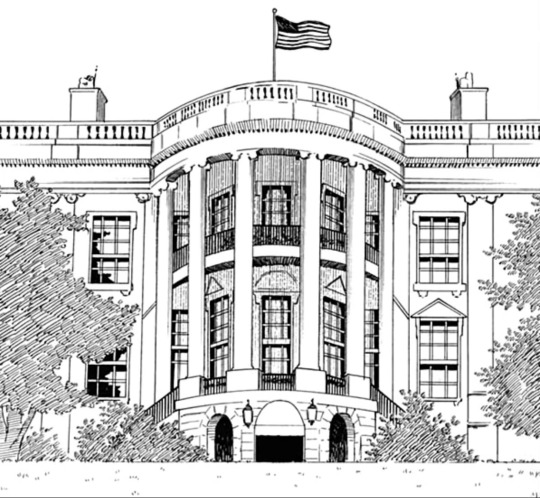
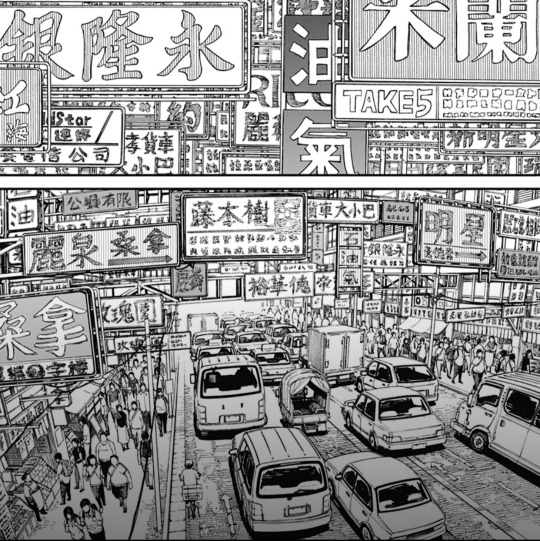
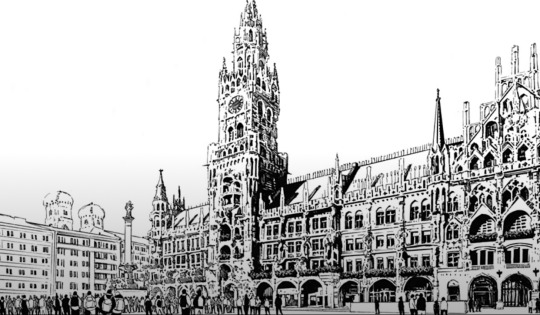
In Japan, the origins of capitalism lie in vigorous state intervention. The period that best characterizes it is the Meiji era, the 19th century. Today, this is revealed by the significant intervention of the Ministry of the Economy.
If all this sounds complicated, there is a first element of definition. If I don't just see a critique of the world of work in the public hunter system, it's also because one of Chainsaw Man's themes is the state. I'm not extrapolating, since it's a theme that recurs several times, whether through Makima and her confrontation with the gun demon, or through the choice of security structure: public. That is, controlled by the Japanese government.
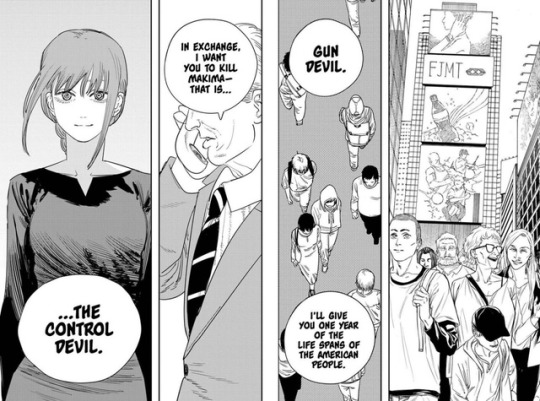
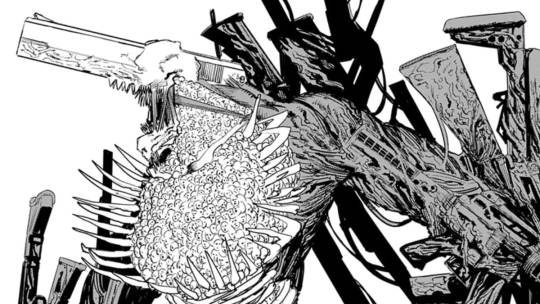
I think that, yes, CSM makes a more global criticism than a specific point of society, and speaks of the relationship between citizen and state.
But let's continue. It's not insignificant either that the first images of the CSM season 1 trailer are of a dark alleyway overflowing with rats. Nor is it insignificant to set up a character, very young, and very poor as a main character. This doesn't shock us, as heroes tend to have tragic pasts, but it's not an empty choice.

When we think of neoliberalism, the example of the United States or the United Kingdom are the first that come to mind. Yet Japan is the OECD country that has seen the greatest rise in inequality, due to deregulation of the labor market and the rise in precarious employment (40% of the working population today) with the privatization of key sectors such as rail and postal services.
Privatization movements ? That's been covered.
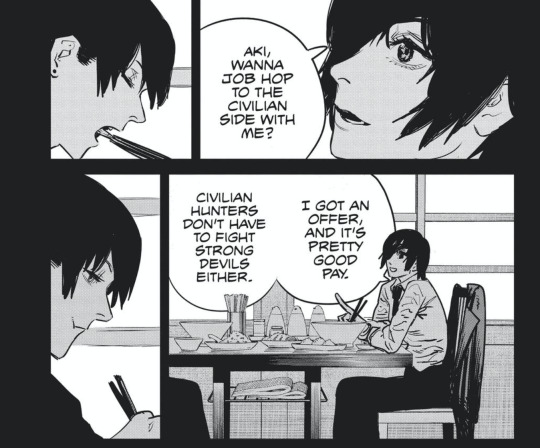
But another feature of Japan's aggressive neoliberalism is the university. Whose entrance fees are increasing atrociously.
University entrance fees ? Lack of education for the most precarious classes ? That's been covered.
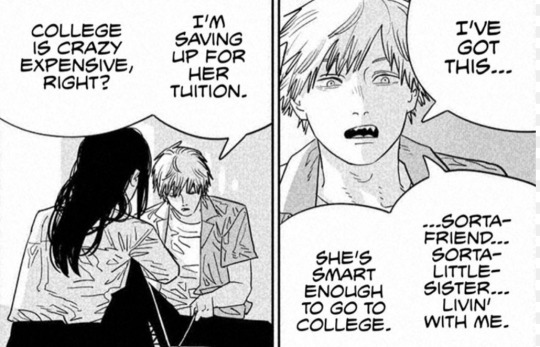
What I'm trying to prove once again is that Fujimoto applies himself to revealing the relationship between individuals and states. Makima, the antagonist, is even subjected to it, inscribed in a hierarchical relationship. She has also become an uncontrollable demon to the point of making the United States swoon, for she is nothing more than a chimera created by the Japanese government, which has hammered her with the doctrine of evil necessary for the greater common good. In other words, collectivism.

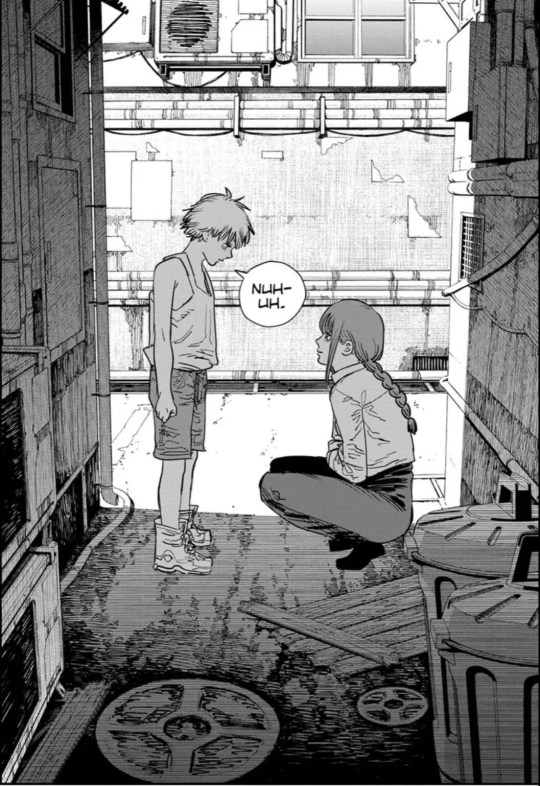
The connection between capitalism and Denji's character is often made, but even Makima, the antagonist, was following a goal imposed by a larger structure, from which she didn't really benefit because she wasn't happy.
Nor is Chainsaw Man just about an extremely harsh working world. We're also talking about the extent to which Denji is satisfied with little things (which Fujimoto also sees in a positive light).
But Fujimoto's main point with Denji is not that the problem lies in his dreaming of toast per se (although that's a problem too), but that there's a disproportion between his sacrifices and his rewards.
It's not insignificant that Denji suffers horribly when he turns into Chainsaw Man, that the system seems to work with him because he sees himself only as a tool.
Capitalism is defined above all by the fact that the worker does not reap all the benefits of his work.
Denji literally produces the added value that will serve his structure without perceiving the benefits in the extreme. Since Makima is going to take all the benefits away from him.
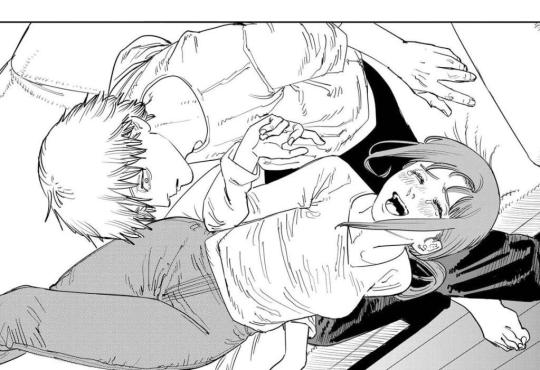
Is it fair, then, to speak of a simple critique of labor when we know that the antagonist is the product of the Japanese government? Don't think of the critique of the world of work as a separate, singular critique, but as part of a critique of a more global system: Japan and its current regime, capitalism.
For it is the relationship between the economy and the state's conception of it that affects the world of work. The liberalization movement that began in the 1980s and accelerated in the 2000s and 2010s is a striking example of this. What is the clearest result of the relationship between globalization and Japan than manga ?

If there's one thing that helped me understand Fujimoto's interest in these issues, it's his relationship with his own industry. His works culminate in themes relating to the community and the individual, and their relationship with art and culture. Just think of all those movie scenes.
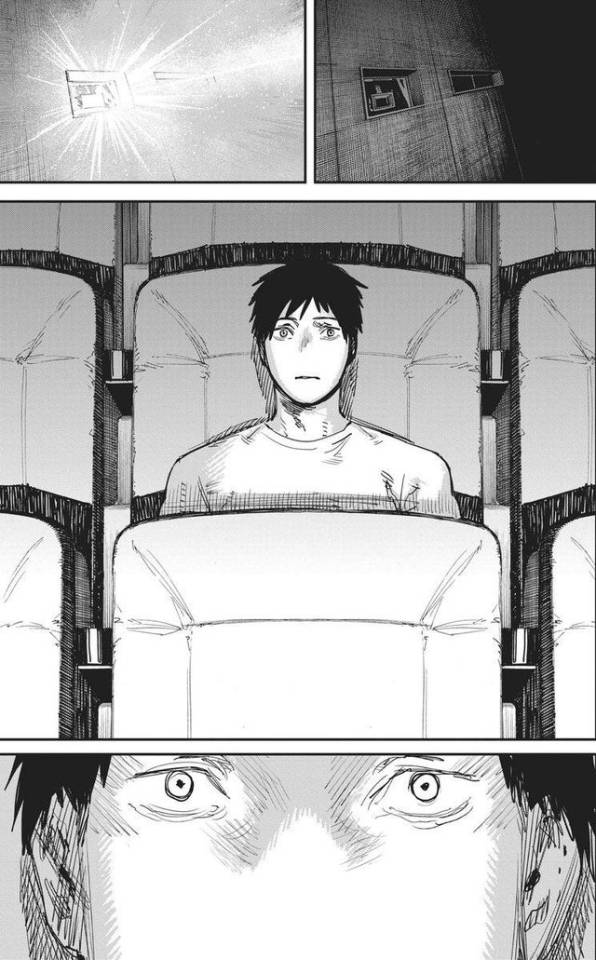
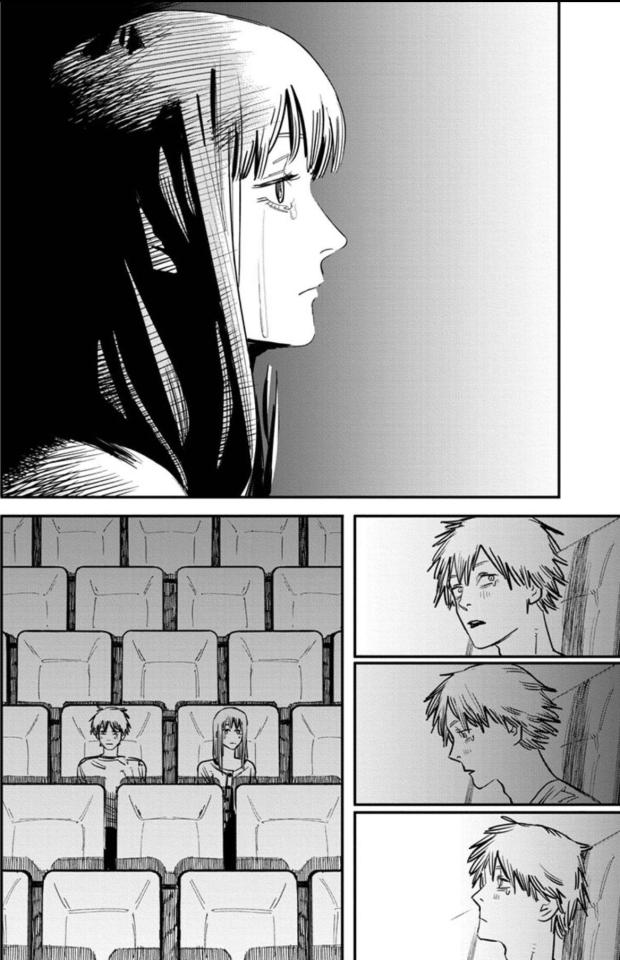

Fujimoto isn't delivering a critique of capitalism because it's fashionable to do so, he's following a lineage of his own.

Fujimoto isn't delivering a critique of capitalism because it's fashionable, he's following a lineage, also talking about the relationship between capitalism and his art. The mangakas themselves are trapped in a logic of commercialization and commodity production, to the detriment of creativity itself. I feel that Part 2 is a complete response to Chainsaw Man's worldwide success. The way Denji's daily life hasn't changed a bit, and also the parallel with Fujimoto.
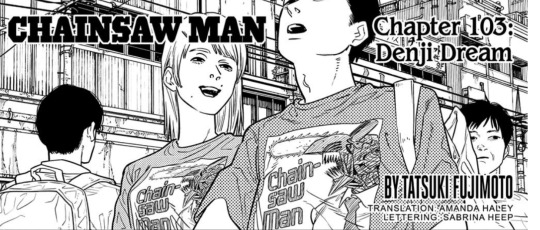
An ultra-popular author... but one who turns in a chapter once a week.

#my thoughts#analysis#csm#chainsaw man#chainsaw man spoilers#ask#fujimoto#csm part 1#csm part 2#fujimoto tatsuki#thank for the ask!!
152 notes
·
View notes
Text
Umbrella Pharmaceuticals - Chapter 62
Summary:
Albert Wesker becomes captain of the STARS. Alexia Ashford and William Birkin begin development of a new virus for Oswell E. Spencer.
1
Brian Irons cleared his throat as he entered the meeting room. Those present crowded in a circle around the chief of police.
“Gentlemen, meet Albert Wesker,” said Irons with a blond man at his back.
The blond man stood to his full height.
“Pleased to meet you,” he said succinctly.
“Wesker has been elected captain of the S.T.A.R.S. Alpha team. Wesker has a military background and has worked as security chief in the private sector. Behave and obey his orders as if he were your father.”
The assistants looked at him curiously. Albert looked at them with cautious indifference.
“Wesker, meet the members of Alpha team: Jill Valentine, Barry Burton, Chris Redfield, Joseph Frost and Brad Vickers. And the members of Bravo Team: Captain Enrico Marini, Richard Aiken, Kenneth J. Sullivan, Forest Speyer, Edward Deway, Kevin Dooley and Rebecca Chambers.”
Albert nodded to them all and shook their hands.
“With this, both teams are complete. We expect routine operations to begin next week. Until then, stay tuned.”
He was doing this as a personal favour to Spencer.
Spencer asked him frankly: the chaos unleashed by Alexia Ashford and William Birkin in Raccoon City had prompted heightened security in the county, and the arrival of a flood of curious onlookers roaming the city to uncover the perpetrators of the most horrific attack on American soil to date.
One of these reinforcements emerged by federal order at the Raccoon City police station: the STARS, a special operations SWAT team. The problem was not the RPD, but that this kind of special teams became fashionable and served as a precedent for the organisation of new ones. And the larger the police force in Raccoon City, the greater the likelihood that one of them, for whatever reason, would discover something they shouldn't have.
Umbrella concentrated its most successful projects in that city, and Spencer had invested a great deal of capital in making it that way; so, he was not happy about being undermined.
Albert agreed because Spencer, his target, had asked him in person. He saw him again: a sickly, badly aged old man, who had lost none of the fire in his mischievous gaze.
Spencer had a plan, but he wouldn't tell him. He probably hadn't told anyone.
In any case, he didn't care because he had accomplished his main objective.
Now he had to find out what that plan was.
2
“Alfred.” His fiancée called out to him in Dutch from the balcony. “Why aren't you coming? What are you doing?”
Alfred got up from the armchair where he had been talking on the phone. He went out onto the balcony, where he hugged his fiancée's hip.
“I'm sorry, darling. I was on the phone.” Alfred kissed Liv's neck.
The breeze off the Mediterranean Sea ruffled her hair so that Alfred ended up with a lock of it in his mouth. He slapped it away, a gesture that amused Liv, and for which she gave him a kiss on the cheek.
“Who was that?” Liv asked, leaning against Alfred's shoulder.
“My father.”
“And what did he want?”
“We have to push back our wedding date.”
Liv raised her eyebrows and looked at Alfred in simultaneous surprise and sympathy.
“Why? What's wrong?”
Alfred hugged Liv and kissed her on the head.
“He wants me to be by his side in Edonia to accomplish our mission,” Alfred whispered contentedly.
Liv increased the strength of her embrace.
“It's all right. Just come home, okay? I love you.”
Alfred stroked her back.
“Promise me you'll always be by my side,” Liv murmured.
“I never break a promise,” Alfred replied.
3
Simmons passed him a clipboard with the latest NATO report.
“We're in position, sir.”
Alexander handed the clipboard back. He had dressed in half a military uniform for the occasion.
His father's dream.
Alexander readjusted his flak jacket and walked over to the board with information on NATO troop positions and rebel army areas.
A Western-funded coup had provoked a civil war in the country to depose the government elected after the dissolution of the Soviet Union. In exchange for its participation and Umbrella's involvement, it had been promised the privilege of enjoying a monopoly when its reconstruction began. However, that was a secondary benefit.
He had come in person to witness the realisation of his father's dream, and he wanted his son to accompany him to share in the realisation of that dream.
The biological weapons were ready to be deployed and to fulfil Alexander's defined objective: total annihilation.
The country would burn to the ground, and so the Ashfords, the Stuarts, would manifest their might: with death and fear, just as their ancestors had done.
And, of course, without the danger of mutually assured destruction.
4
He curled up on the mattress thrown on the floor that served as his bed. Packages of ready-made food clumped around him, and the television had long since ceased to broadcast anything that was static.
He had disappeared.
He had cancelled himself out after that.
The Incident, as he called it, had wiped him out inside, and he decided it was best to disappear for good.
He was a monster.
That was what he had never wanted to admit: that he was a monster. For this reason, he would never be reunited with his family.
He would never see Sherry again.
It became clear to him when he was with the twins in Scotland, after the Incident. The shrinks were honest with him: he was a sociopath. He was a dangerous individual, full of hatred and contempt for human life.
He believed he was a good, functioning citizen, but that was a lie.
You took the job, Alexia's voice sounded in the distance. No one forced you to do what you did.
She was right.
No one forced him, and that's why he was a despicable being.
A monster.
He didn't want to go back to Umbrella.
He didn't want to exist anymore.
He was a parody, a shadow of his former self.
His parents would have forgotten him, if he really had parents.
Wood creaked.
Footsteps.
William didn't bother to raise his head or move. He didn't feel like doing anything.
Whoever it was, he hoped it would put him out of his misery.
“William.”
William shivered. That voice.
Alexia.
Alexia sat in a lone cheap chair she'd picked up from a corner. Alexia's neat, regal appearance contrasted with William's grimy decadence.
“William. I need you.”
William sank his head into the pillow, pretending not to hear her words.
“William. I promised Spencer that you and I would develop a virus just for him.”
“You can do it on your own...”
“No. I need you. It'll be the best virus ever developed with the Progenitor. We'll use Spencer as a test subject.”
William sank his head further into the pillow. He didn't answer.
“Our latest project at Umbrella,” Alexia continued.
William pushed himself off the pillow to breathe normally.
“I'm not going back,” William said.
“You want to,” Alexia said. “I know you do.”
“I don't...”
“Spencer is planning his departure from Umbrella. The virus in exchange for a mutually beneficial exit. My father would take over management of the corporation. Spencer would step down to stay on as owner. Both would step down as chairman and CEO. My father and Spencer have offered me to be the new CEO, but I have no desire to remain at Umbrella.”
William curled up on the mattress.
“I'm going to start my own company, and I want you to join me,” Alexia said.
William's hair stood up.
“No limits. No superiors. Just you and me in front of the world.”
William remembered the penthouse of the skyscraper. Alexia pressed the button without the slightest sign of disturbance or regret. He missed the shot on purpose.
“What do you want from me?”
“To possess you.”
William was unable to discern whether Alexia had actually said that or dreamt it. William sat up on the mattress.
“What does Spencer want...”
“To be a god.”
“God...”
“A biological weapon. A superman.”
“How do the X-Men...”
Alexia handed him a folded piece of paper.
“Monday at five o'clock at that address.”
Alexia got up from her chair and left. William unfolded the paper: Raccoon City Underground Laboratory.
5
“What will your company be called?” Alfred asked.
“I don't know.”
“Can I be the one to name it?”
Alexia shrugged.
“I'll see what I can come up with.” Alfred stroked his sister's thigh affectionately. “I'm so happy for you. After all you've been through, you're finally happy.”
Alexia stroked Alfred's hand.
“I'm not sure if it's happiness, but I don't feel so... so lost.”
“It is. I'm sure it is.”
“I've gone to get William. I'll see him at the lab next week.”
Alfred looked serious.
“Are you really going to do that favour for Oswell?”
“Yes. It'll be a first step.”
“And then what?”
“I don't know. I can't predict what will happen, Alfred.”
“I don't believe you.”
Alexia sighed.
“I don't know,” she repeated.
“Don't leave me.”
Alfred and Alexia looked at each other.
“I won't,” Alexia replied.
6
She felt like Gregory Samsa on the worst day of his life. In a handful of days, in a very few years, she had gone from being the heiress of a wealthy American rancher to the legitimate daughter of the world's first billionaire.
Alexandra Spencer.
Her British passport, obtained by Spencer as a personal favour to Anthony Campbell, made her giddy. She was unprepared, she told herself, but her actions said otherwise.
She had become her biological father's right-hand woman, and she felt unpleasantly overwhelmed and unstoppable. That was power, real power. Yet she couldn't help feeling strange, as if she herself was her own stranger.
She compensated for this inconsistency by fixating on her father, who had begun to be strangely friendly with his bastard daughter.
Oswell told her of his plan.
And she felt the power again, the real power.
But first, she had to plan her father's resignation and his agreement with Alexia. Alexander accepted Spencer's word without buts: the two men had tacitly agreed that this was the end of their long and individually fruitful partnership. What Spencer did with the virus developed by Alexia was none of his business; once the partnership was broken, it would be as if the two families had never worked together.
Oswell trusted his daughter, and it was that trust that she used as a guide.
But how long, and how long would she trust Oswell? And what about the virus? Would it be possible to use the Progenitor virus to become a god?
Would metamorphosis be possible?
7
Oswell signed the final memorandum detailing his plan for the last five years of the last decade of the 20th century.
The goal was clear: maximise Umbrella's profits to retire in style. His strategy: war, cost-cutting and exponentially increasing productivity.
He would retire as the greatest man on Earth before embarking on his new journey.
Alexander would not stand in the way. He owed it to him.
Spencer held up a photo: Edward Ashford, James Marcus and himself posing at the Ndipaya shrine.
“I'll see you in the Beyond.”
He tossed the photograph into the flames of the fireplace.
#resident evil#albert wesker#alexia ashford#alfred ashford#alexander ashford#william birkin#oswell e spencer#alex wesker
14 notes
·
View notes
Text
America’s Future Depends on DOGE
Wall Street Journal
If Trump and Musk don’t succeed in showing the bureaucracy who’s boss, it’s likely no one ever will.
Critics view the Department of Government Efficiency’s emails asking federal employees for evidence of productivity as chaotic, arbitrary and even cruel measures to impose on a devoted civil service. But Elon Musk is simply bringing normal private-sector standards to a government that desperately needs them. Since the Pendleton Act of 1883 introduced merit-based selection and civil-service job protections for federal workers, the administrative state has proliferated without sufficient checks and balances from the president or Congress.
The federal bureaucracy has ballooned from a few agencies to more than 400, many of which are “independent” of the president. Americans often view the president as responsible for the actions those agencies take. The system nudges new presidents to give up and go along. And that’s exactly what they’ve done. No president—not Calvin Coolidge, Herbert Hoover, Richard Nixon or Ronald Reagan—has cracked this nut. Most reforms have made the administrative state larger, not smaller.
As we’re seeing now, substantial opposition awaits anyone who challenges the bureaucracy. Unions are powerful. Intimidation from those with institutional knowledge can be overwhelming. Fear of the media has also been a deterrent to action. Every president has been at least somewhat fearful of the intelligence agencies. Industry leaders who have captured the agencies, including many campaign donors, have been too powerful to unseat or control.
Countless cabinet secretaries come and go with the intention of changing the system. They get big offices, a nice portrait and social status, but the bureaucrats know that the political appointees are temporary and easily can be ignored. Frustrated by institutional inertia, the appointees often leave outwitted, outgunned and demoralized.
Meanwhile, the American people feel increasingly oppressed, taxed, regulated, spied on, browbeaten, hectored and harassed. Voting never made a difference because the politicians no longer controlled the system. The bureaucracies rule all. We’ve come to know this in our gut, which is why voters’ trust in the system has eroded as agencies’ power has built up.
The Biden years underscored this point. We didn’t even need a conscious or active president, only a figurehead. Behind the scenes, institutions ran everything.
How can the U.S. deal with this problem? President Trump alone figured it out in his last term: He simply took charge of agencies in a limited way with selective firings, which he believed he had the legal authority to do. This unleashed howls of horror and whispers of plots from his critics, including in the media. Entrenched administrators hatched clever schemes to thwart his plans and show him who was boss—not the democratically elected president but the bureaucracy.
The message from today’s civic elites is that the president’s job is to pretend to be in charge while doing nothing meaningful. Shut up. Don’t disturb the administrative state. Let it keep doing its thing without oversight or disruption, and you’ll get your library and bestselling memoir.
Mr. Trump refuses this deal. In his second term, he’s determined to slay the bureaucratic beast he knows all too well from his first term and the Biden years. DOGE’s efforts are epic, breaking more than a century of acquiescence to the deep state. The Trump team is courageously confronting the problem head-on, come what may. Mr. Trump’s allies know that they must act quickly and with some degree of ferocity, even recklessness, lest we default back to the status quo of leaders who pretend to be in charge while the embedded “men of the system”—to adapt a phrase from Adam Smith—run things behind closed doors.
It’s critical that this bureaucracy-gutting effort succeeds. There might never be another chance.
47 notes
·
View notes
Note
I've been checking up the elections in Ireland out of curiosity (and also because of taking into consideration the steadily worsening situation in regards to Democracy across the globe), but I find I don't really understand it very well. Who's currently considered the most likely candidate to lead Ireland, and is it necessarily a good, bad, or complicated thing? Irish politics seems to have a lot of nuances that I don't really have the context and understanding to "get".
So, we have a Parliamentary system. It's the leader of the largest party after that is usually the Taoiseach, the head of Government. Or, at the very least, the largest party in the coalition of parties who've come together to share power.
(We also have a directly elected President as our Head of State. His only real power is to send bills to the Supreme Court to check if they're constitutional before signing them into law.)
However, last term in the Dáil, none of the biggest parties got enough votes to secure a majority on their own, or even a coalition with a smaller party. The two biggest parties, Fianna Fáil and Fine Gael had to go into coalition with each other, because they refused to go into coalition with the other biggest party, Sinn Féin.
Because these two parties have run the state since the begining, neither wanted to be the "Junior" partner in the coalition (which is usually a electoral death sentence the next election), so they decided to be equal partners. They devised a system where they would trade off the Taoiseach role so that both sides would have roughly equal time.
This is called a "Rotating Taoiseach". Or "Rotisserie Taoiseach", depending on how serious the political commentary is.
After this election, we have the same scenario: neither side has enough seats to make a government without the other (or Sinn Féin, who they refuse to talk to).
However, this time rather than the seat split being 38:35, it's now 48:38. Fianna Fáil is much bigger than Fine Gael.
In most circumstances this would mean that Fianna Fáil's leader, Micháel Martin (pronounced Me-Hawl) would be Taoiseach, no rotation.
But Fine Gael has their pride and dignity. Even with the larger seat gap, they likely wouldn't accept being a Junior Partner. They'll want the Equal Partner deal again, with it's Rotating Taoiseach.
On the one hand, they're not really in a position to demand it. On the other hand, they can just stonewall government formation until they get it. The only other option is Sinn Féin, and none of them want that.
I'd say it's likely we'll see another Rotating Taoiseach, between Martin and the Fine Gael leader, Simon Harris.
As for whether this situation is good or not? Well, it's... eh. It's eh.
Both Fianna Fáil and Fine Gael are neoliberal. They're somewhat progressive socially, but are beholden to corporate interests financially. Under their leadership we've entered a housing crisis, a homelessness crisis, a refugee housing crisis, and a healthcare crisis. They say their solutions to each of these are working, but it won't be fixed overnight, despite the fact that most of these problems have been ongoing for a decade.
It's a combination of the austerity measures they imposed and their belief the private sector will fix the problems that's causing most issues in Ireland at the moment.
So things aren't going to suddenly go to shit here, but they aren't suddenly going to get better. Any movement in any direction will be a slow slide. Maybe things will get better, maybe things will get worse, whatever happens will happen slowly.
15 notes
·
View notes